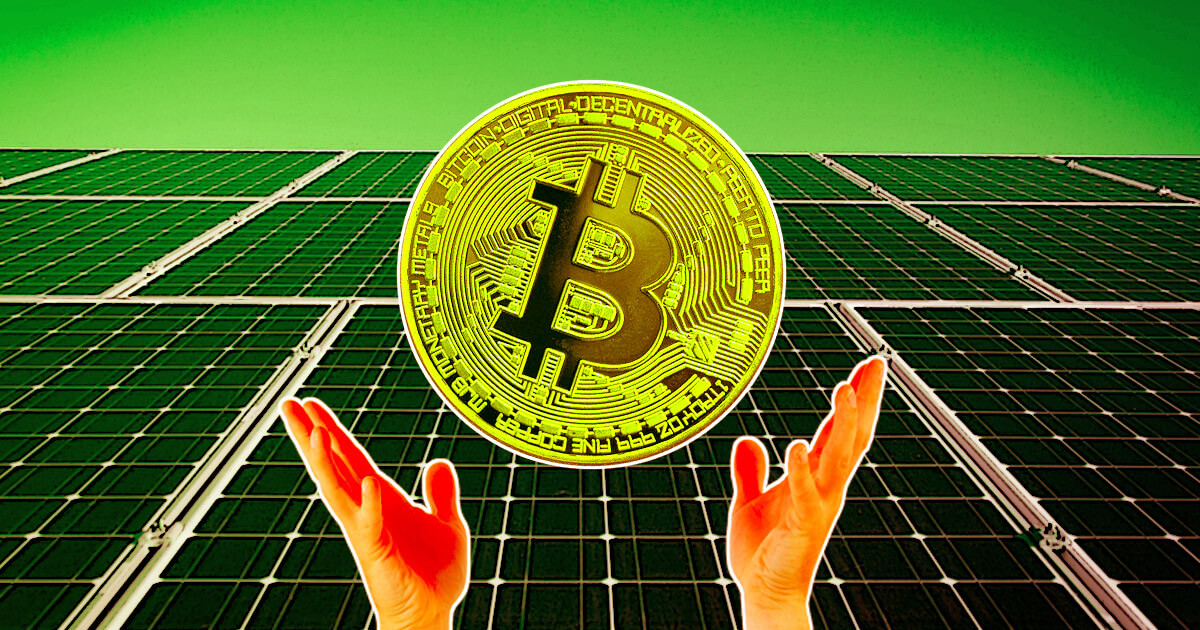US Senator Warren appeared on the NBC News “Meet the Press Reports” show to speak on the state of the cryptocurrency market and digital currencies in general. When asked if she considers bitcoin to be “this decade’s real estate bubble,” she said:
“The whole digital world has worked very much like a bubble works. What has it moved up on? It’s moved up on the fact that people all tell each other that it’s going to be great, just like it was on that real estate market.”
Senator Warren continued on to say:
“How many times did people say: ‘Real estate always goes up. It never goes down’? They said it decades ago before the last real estate bubble. They said it in the 2000s, before the crash in 2008.”
This formed part of her view that cryptocurrencies would eventually be regulated and that the US should create its own Central Bank Digital Currency (CBDC). However, are we really in a bubble?
The cryptocurrency market has experienced multiple bull markets that have outperformed traditional assets by a landslide.
For example, the average return from investing in the stock market is around 9.9% according to Vanguard. On the other hand, investing in cryptocurrency can see users gain anywhere from over 50% in a day to over 11,177% in a year.
These kinds of returns are not new to the cryptocurrency market and have sparked talks about Bitcoin and other cryptocurrencies being in a bubble or comparable to the Tulip Mania during 1634-1637.
Over the years, the value of Bitcoin and other cryptocurrencies has risen and fallen multiple times, going through bullish (positive price growth) and bearish (negative price action) periods.
Are we really in a bubble that’s about to burst? To understand this let’s look at how the market has performed since the inception of cryptocurrencies and compare it to where we are today.
We’ll look at Bitcoin in particular and how it has experienced multiple ‘bubbles’ over the years.
Previous Bitcoin “Bubbles”
Bitcoin has experienced high price peaks before a falling in value many times since its inception in 2009. We’ll look at the biggest bull markets and how each one ended.
The 2011 Bitcoin Bull Market
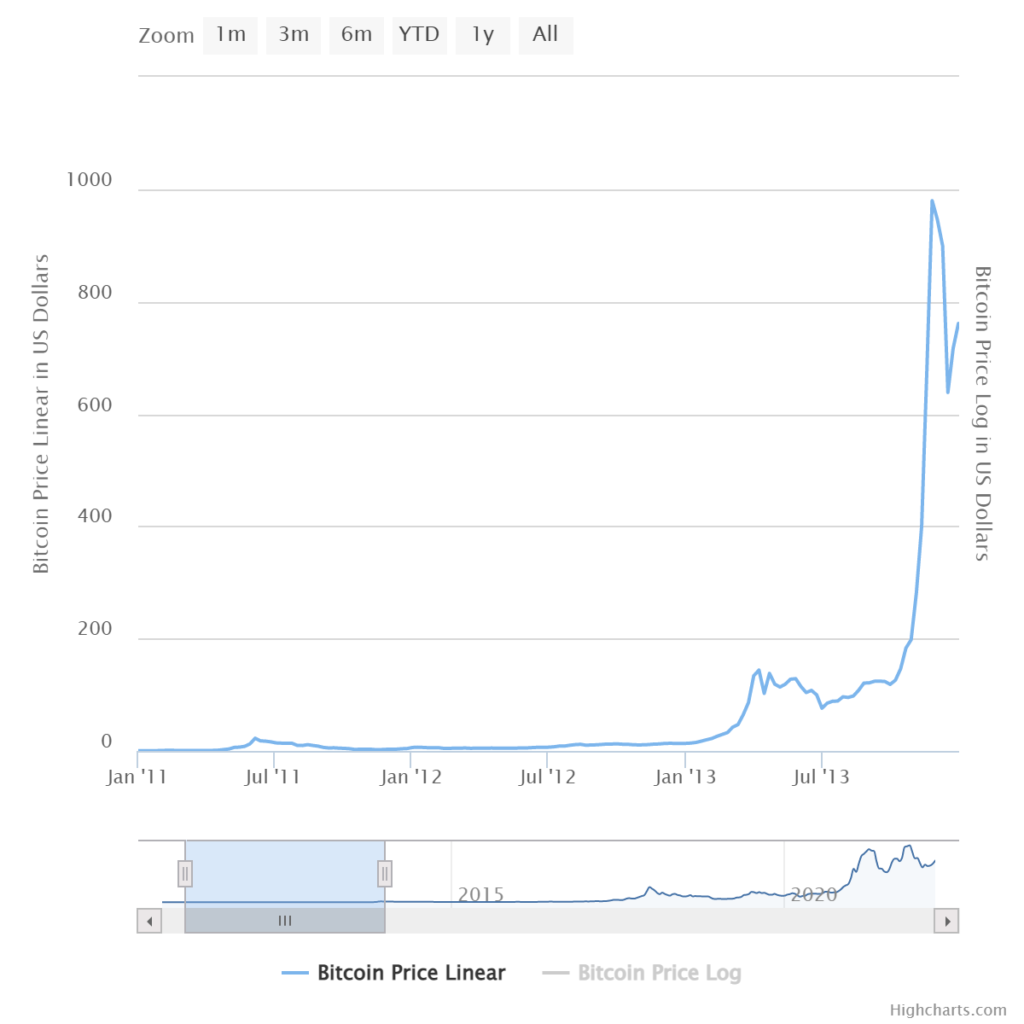
Bitcoin began 2011 with a cost of 30 cents ($0.30), rose to a dollar in February, then soared to $10 in June, before tripling to $30 in less than a week.
The “bubble” burst a few days later on June 11th, pushing the price down to $15 (a 50% decrease). Bitcoin then soared to $20 before plummeting down to $5. This is the largest “bubble” in Bitcoins history right now.
Bitcoins Growth: Bitcoin’s value grew over 100x, the biggest growth the cryptocurrency has ever seen. 2011 was Bitcoins first bull market, also referred to as Bitcoins “first bubble”.
The 2013 Bitcoin Bull Market
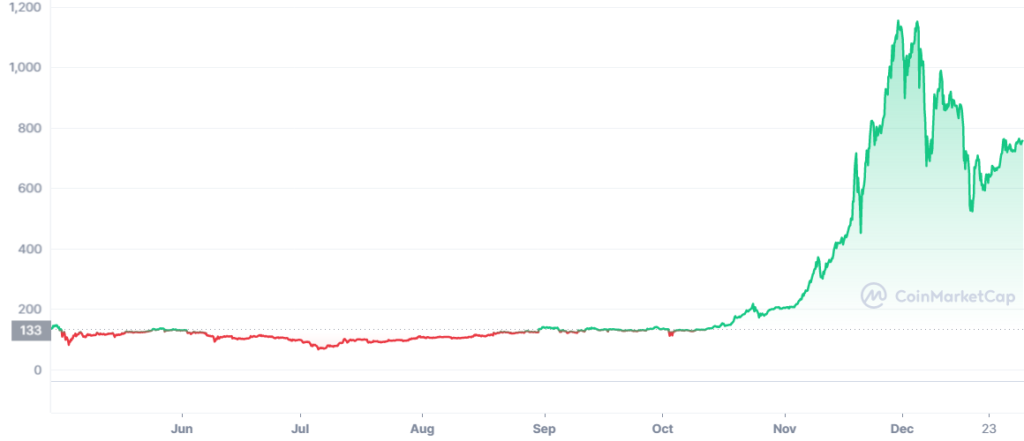
The year 2013 saw Bitcoin’s value go through two peaks before the blow-off top that led to a multi-year bear market.
Bitcoin began the year at roughly $15 and by the middle of March had risen to $50. By April, one Bitcoin was worth $100, and in less than two weeks, it had doubled in value, making one Bitcoin worth around $230.
The price decreased to $160 the next day, then to $70 a week later before rebounding to $100 by the end of April.
Bitcoins Growth: Bitcoin’s value grew 17x before the drawdown
Bitcoin climbed to $250 in November after stabilizing at $100, and the price more than doubled in a month, hitting $1,100. That’s a fourfold increase in less than a month.
The “bubble” burst once more, as Bitcoin fell to $700.
Bitcoins Growth: Bitcoin’s value grew 11 times during the second leg up in 2013.
Bitcoin’s adoption really started to grow in 2013, during February of that same year, Coinbase reported selling over $1 million worth of Bitcoin in a single month, with each Bitcoin selling for over $22 each.
The growing popularity of Bitcoin started to attract attention from state officials in 2013. On August 6, 2013, Federal Judge Amos Mazzant of the Fifth Circuit’s Eastern District of Texas ruled that Bitcoin is “a currency or a form of money” and thus subject to the court’s jurisdiction.
Germany’s Finance Ministry also chimed in, classifying Bitcoin as a “unit of account” (a financial instrument) rather than e-money or a functional currency, a classification that has legal and tax implications.
The digital currency also drew some scrutiny with Alan Greenspan, a former chairman of the US Federal Reserve, referring to Bitcoin as a “bubble” on December 4, 2013.
Bitcoin’s Growth: In total Bitcoin, value grew 73x during 2013.
The 2017 Bitcoin Bull Market
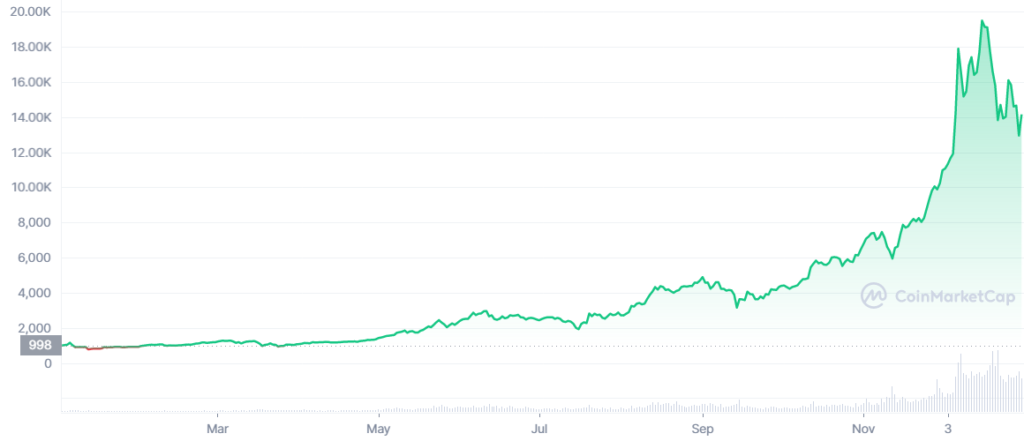
This is the so-called “bubble” that led to cryptocurrency going mainstream. Bitcoin began the year at $900 and ended the year at $20,000, before plunging to $15,000 and then $8,000 in 2018.
2017 was a big year for cryptocurrency in general, bringing loads of media attention and new investors to the cryptocurrency market. The number of companies accepting Bitcoin also increased dramatically. The number of online retailers accepting bitcoin in Japan was expected to grow to over 260,000 stores in 2017, according to Bitcoin.com.
Legislators and traditional financial institutions started to recognise Bitcoin as a legitimate currency. Japan, for example, approved legislation allowing Bitcoin to be used as a legal payment method, while Russia stated that it would legalize the usage of cryptocurrencies such as Bitcoin in that same year.
The ICO craze may have played a role too, with an estimated $4.9 billion being raised through ICOs in 2017.
Bitcoins Growth: Bitcoins value grew over 28 times (2,800% growth), currently the third largest “bubble” in Bitcoins history.
The 2020 Bitcoin Bull Market
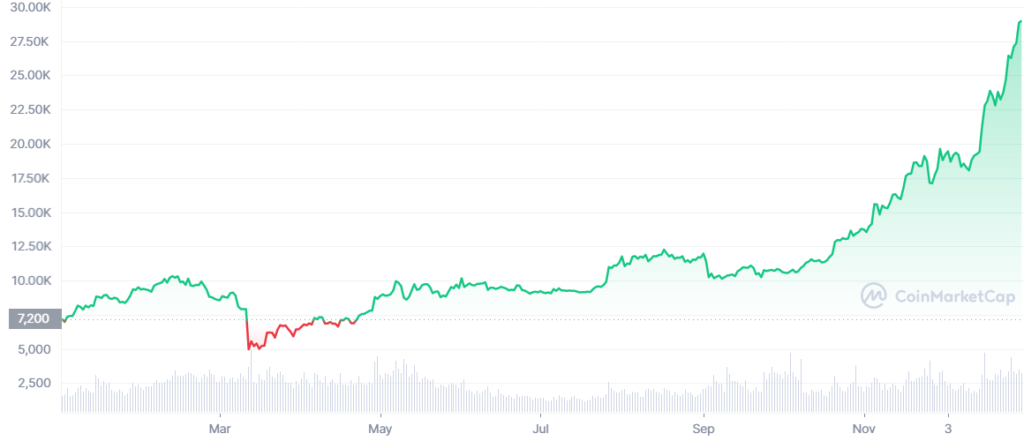
Bitcoin began 2020 at around $6,985 before falling to $4,970 on the 12th of March. Bitcoin rose again to $9,951 on the 7th of April before beginning a slow climb up to its peak of $29,001 in December 2020.
One of the reasons for Bitcoin’s growth in 2020 was a large influx of institutional investors from traditional sectors including investment trusts and pension schemes. Even previous skeptics like JP Morgan changed their tone towards Bitcoin, saying that they now believe that the cryptocurrency has a bright future.
Big names like billionaire investor Paul Tudor Jones and insurance company MassMutual invested substantially into Bitcoin. These factors all added to the cryptocurrency’s credibility and signalled that it was growing and more widespread.
Additional driving factors included the public’s growing interest in Non-Fungible Token (NFT) art pieces and profile pic/picture for proof (PFP) style images like the Bored Ape Yacht Club collection.
Bitcoin’s Growth: Bitcoin’s value grew 4.15x in 2020
The 2021 Bitcoin Bull Market
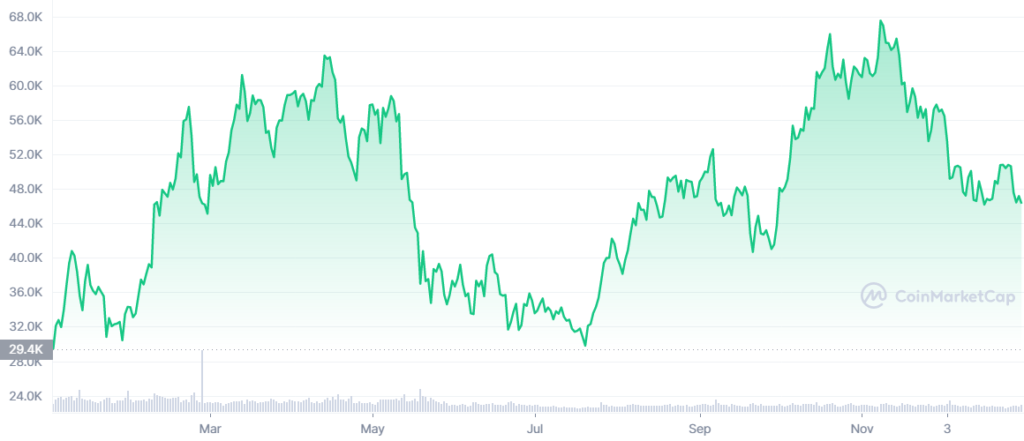
2021 was a bit rocky for Bitcoin, with its value peaking and falling twice. Whilst Bitcoin attracted more media attention in 2021, the price didn’t grow that much compared to 2020.
Bitcoin started 2021 with a price of $29,374, before peaking at over $63,503 on April 13th, before falling to around $29,807 on the 19th of July. Bitcoin peaked again at $67,566 on the 11th of October before falling to $46,666 in December.
Institutional investors played a role in Bitcoins growth in 2021 again, with MicroStrategy announcing that they would be investing over a billion dollars into Bitcoin.
“The Company continues to believe bitcoin will provide the opportunity for better returns and preserve the value of our capital over time compared to holding cash. We also remain dedicated to our customers and our goal of operating a growing profitable business intelligence company,” said Phong Le, President & CFO of MicroStrategy.
PayPal also announced that its 400 million users would be able to buy, sell and store cryptocurrencies via their platform.
“Our global reach, digital payments expertise, and knowledge of consumer and businesses, combined with rigorous security and compliance controls provides us the unique opportunity, and the responsibility, to help people in the UK to explore cryptocurrency.” said Jose Fernandez da Ponte, VP & GM of Blockchain & Crypto at PayPal.
“We are committed to continue working closely with regulators in the UK, and around the world, to offer our support—and meaningfully contribute to shaping the role digital currencies will play in the future of global finance and commerce.”
Grayscale, a cryptocurrency investing firm located in the United States, also made it possible for anyone to invest in major cryptocurrencies without needing to hold the underlying assets. The investment firm saw a lot of success in 2021, and the firm had been aggressively buying up Bitcoin during that year.
Bitcoin’s Growth: Bitcoin’s value grew 2.3x during this time period.
Bitcoin today in 2022
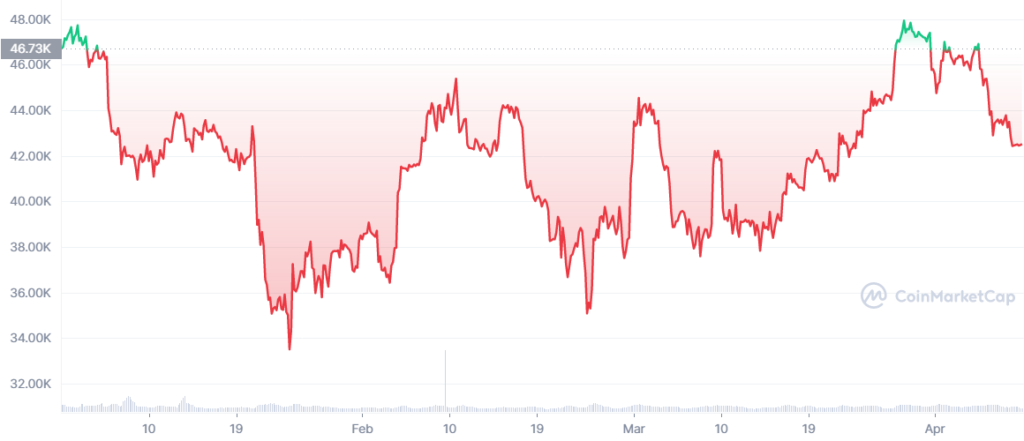
Bitcoin got off to a bearish start in 2022, falling from $46k to around $33k before rebounding to the current price level of $42k today.
If we look at how Bitcoin has performed through its previous years we can see that each bull market brings lower returns:
- 2011 – 100x
- 2013 – 73x
- 2017 – 28x
- 2020 – 4.15x
- 2021 – 2.3x
Instead of a bubble, this looks more like an emerging market that is starting to mature, with volatility reducing as time goes on.
Bitcoin and other cryptocurrencies most likely cycle through bull and bear phases, similar to the stock market. It’s the increased volatility of cryptocurrencies that may give the impression of a market bubble since the price swings are more dramatic than in traditional markets.







